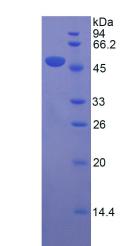Recombinant Apolipoprotein D (APOD)
Apo-D
- Product No.RPB968Mu01
- Organism SpeciesMus musculus (Mouse) Same name, Different species.
- SourceProkaryotic expression
- HostE.coli
- Endotoxin Level<1.0EU per 1µg (determined by the LAL method)
- Subcellular LocationSecreted
- Predicted Molecular Mass51.5kDa
- Accurate Molecular Mass52kDa(Analysis of differences refer to the manual)
- Residues & TagsMet1~Leu189 with N-terminal His and GST Tag
- Buffer FormulationPBS, pH7.4, containing 0.01% SKL, 1mM DTT, 5% Trehalose and Proclin300.
- Traits Freeze-dried powder
- Purity> 97%
- Isoelectric Point5.8
-
Applications
Positive Control; Immunogen; SDS-PAGE; WB.
If bio-activity of the protein is needed, please check active protein. - DownloadInstruction Manual
- UOM 10µg50µg 200µg 1mg 5mg
- FOB
US$ 176
US$ 440
US$ 880
US$ 2640
US$ 6600
For more details, please contact local distributors!
SEQUENCE

USAGE
Reconstitute in 10mM PBS (pH7.4) to a concentration of 0.1-1.0 mg/mL. Do not vortex.
STORAGE
Avoid repeated freeze/thaw cycles. Store at 2-8°C for one month. Aliquot and store at -80°C for 12 months.
STABILITY
The thermal stability is described by the loss rate. The loss rate was determined by accelerated thermal degradation test, that is, incubate the protein at 37°C for 48h, and no obvious degradation and precipitation were observed. The loss rate is less than 5% within the expiration date under appropriate storage condition.
GIVEAWAYS
INCREMENT SERVICES
-
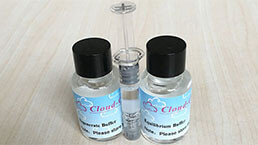 Endotoxin Removal Kit
Endotoxin Removal Kit
-
 BCA Protein Quantification Kit
BCA Protein Quantification Kit
-
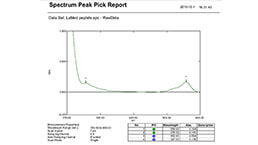 Protein Labeling Customized Service
Protein Labeling Customized Service
-
 Molecular Mass Marker for Protein
Molecular Mass Marker for Protein
-
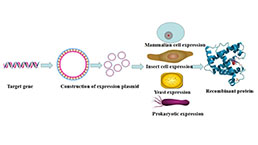 Recombinant Protein Customized Service
Recombinant Protein Customized Service
-
 Monoclonal Antibody Customized Service
Monoclonal Antibody Customized Service
-
 Polyclonal Antibody Customized Service
Polyclonal Antibody Customized Service
-
 Protein Activity Test Experiment Service
Protein Activity Test Experiment Service
-
 Immunoprecipitation (IP) Experiment Service
Immunoprecipitation (IP) Experiment Service
-
 Buffer
Buffer
-
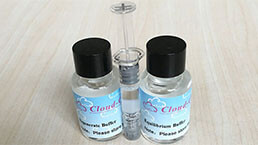 Endotoxin Removal Kit II
Endotoxin Removal Kit II
-
 Real Time PCR Experimental Service
Real Time PCR Experimental Service
-
 Spike RBD Protein (S-RBD)
Spike RBD Protein (S-RBD)
-
 Protein G
Protein G
-
 Protein A
Protein A
| Magazine | Citations |
| Heart and Circulatory Physiology | Endothelial cells downregulate Apolipoprotein D expression in mural cells through paracrine secretion and Notch signaling APS: source |
| Parkinsons Disease | Apolipoprotein D Concentration in Human Plasma during Aging and in Parkinson's Disease: A Cross-Sectional Study Pubmed:29780571 |
| Journal of Prevention and Treatment for Stomatological Diseases | 载脂蛋白D 在人牙髓细胞增殖及迁移中的作用 |
| Cells | Identification of Novel Molecular Markers of Human Th17 Cells Pubmed: 32635226 |
| Catalog No. | Related products for research use of Mus musculus (Mouse) Organism species | Applications (RESEARCH USE ONLY!) |
| RPB968Mu02 | Recombinant Apolipoprotein D (APOD) | Positive Control; Immunogen; SDS-PAGE; WB. |
| RPB968Mu01 | Recombinant Apolipoprotein D (APOD) | Positive Control; Immunogen; SDS-PAGE; WB. |
| PAB968Mu01 | Polyclonal Antibody to Apolipoprotein D (APOD) | WB; IHC; ICC; IP. |



